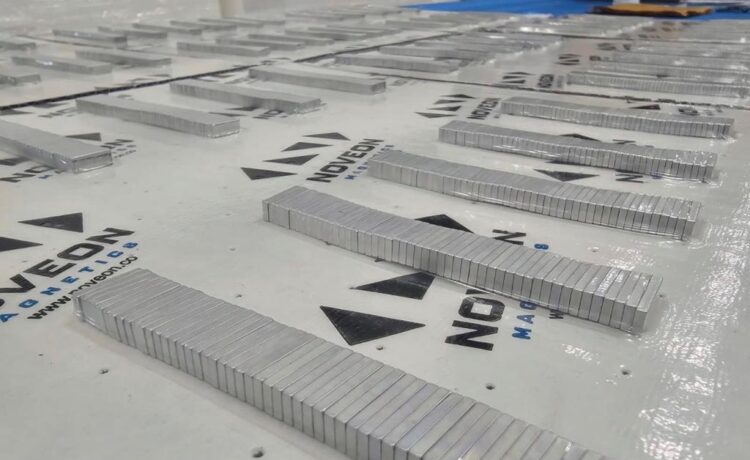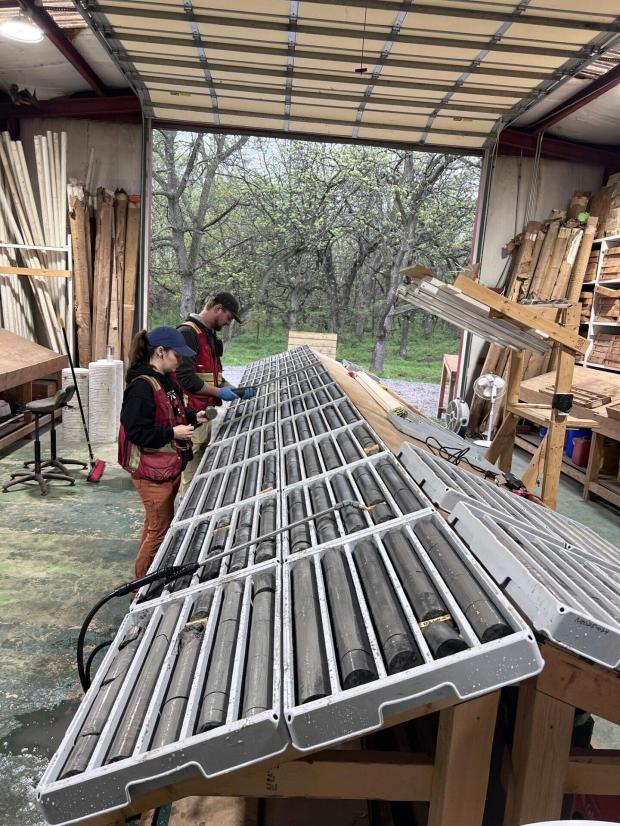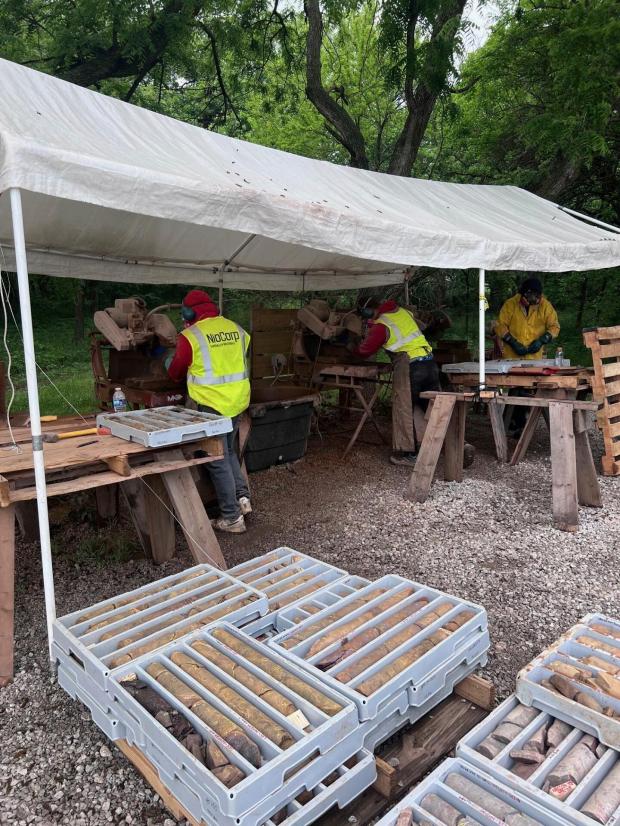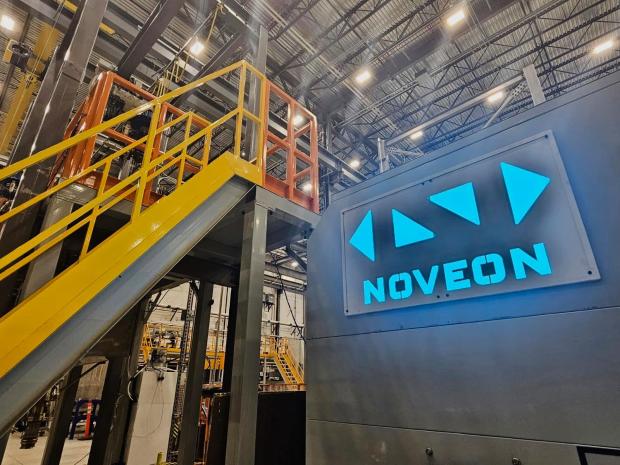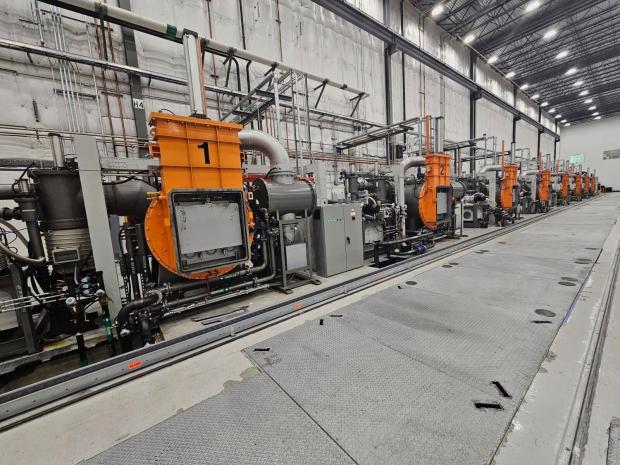By JOSH FUNK and DIDI TANG
OMAHA, Neb. (AP) — U.S. production of crucial components in electric vehicles, smartphones and fighter jets is set to expand rapidly in the coming years, as the Trump administration intensifies efforts to build up the critical mineral industry in the United States to work to break the chokehold that China has on the global supply chain.
The federal government is pumping hundreds of millions of dollars into American companies, has made an agreement with one firm to set a minimum price for some U.S.-produced critical minerals, and has launched an investigation into foreign-made supplies.
“This is the Manhattan Project moment for rare earths,” said Joshua Ballard, CEO of USA Rare Earth, which plans next year to start making the rare-earth magnets that appear in many products.
The White House has made it a priority to revive the domestic critical minerals industry, which is proving urgent after Beijing leveraged its near-monopoly on the products to force the U.S. to the negotiating table during a trade war.
President Donald Trump said this week that China “intelligently went and they sort of took a monopoly of the world’s magnets,” but he expressed confidence in securing supplies because the U.S. has “much bigger and better cards.”
“We’re going to have a lot of magnets in a pretty short period of time. In fact, we’ll have so many, we won’t know what to do with them,” he said as he hosted South Korean President Lee Jae Myung.
Critical minerals have been tied to national security
Industry insiders, analysts and lawmakers have warned for years that America’s dependence on China for critical minerals — a list of 50 minerals that includes 17 sought-after rare-earth elements — is a national vulnerability.
The hard-to-pronounce elements are needed in smartphones, wind turbines and robots as well as missiles, submarines and fighter jets.
“Our national and economic security are now acutely threatened by our reliance upon hostile foreign powers’ mineral production,” an executive order from Trump declared in March.
It was not until Beijing rolled out export restrictions on several rare earths in April — leading to a temporary halt of Ford’s electric vehicle production — that “the problem that for over a decade seemed far away hit close to home,” said Gracelin Baskaran, director of the Critical Minerals Security Program at the Washington-based Center for Strategic and International Studies.
Trump said Monday that he could charge 200% tariffs on Chinese goods if Beijing does not export magnets to the U.S. but noted “that’s perhaps behind us.” Instead, he said he could withhold airplane parts to ground China’s American-made Boeing jets.
When asked about the leverage, Guo Jiakun, a Chinese foreign ministry spokesman, said Tuesday that Beijing “follows the principle of mutual respect, peaceful coexistence and mutually beneficial cooperation” in dealing with the U.S.
“We hope the U.S. will work with us to jointly promote the steady, sound and sustainable development of bilateral ties,” Guo said.
The critical minerals industry welcomes support
The Pentagon is investing $400 million in rare-earth producer MP Materials. It gave the U.S. company a $150 million loan this month, has promised to ensure every magnet made at its massive new plant is bought and set a minimum price for its neodymium and praseodymium products for a decade.
“It looks like we’re going to finally do something to address that issue and make these projects a reality,” said Mark Smith, CEO of NioCorp, an American company working to raise $1.2 billion to produce niobium, titanium, scandium and rare earths in Nebraska.
Over four decades, Smith said he’s seen how the U.S. ceded the industry to China, which came to dominate the supply chain by brushing aside environmental concerns, investing in mines worldwide, developing advanced processing technology and setting low prices to squeeze out competition.
Previous efforts by U.S. companies to eke out a viable business proved futile when China flooded the market with low-priced products, chasing away potential investors.
NioCorp recently secured up to $10 million from the Pentagon, which helped pay for exploratory drilling this summer.
While it is unclear if the government would extend a minimum-price deal to other U.S. companies, Smith said the current support is “unbelievable” compared with the past. A price floor, he said, “just takes away the Chinese modus operandi that they’ve had for forever.”
About 220 miles away from where MP Materials is building a magnet plant in Fort Worth, Texas, Noveon Magnetics runs America’s only factory currently making rare-earth magnets. Located south of Austin, it is ramping up production to make 2,000 tons of magnets a year.
“I certainly hope and think it actually is not what may be the last of the efforts by the U.S. government,” Noveon Magnetics CEO Scott Dunn said of the Pentagon-MP Materials partnership.
Even with all the new production aiming to come online in the next few years, American companies are still nowhere near being able to satisfy North America’s demand for roughly 35,000 tons of magnets a year, analysts at Benchmark Mineral Intelligence estimate. And the demand could double in the next decade.
Ballard, whose USA Rare Earth plans to start making about 600 tons of magnets in Oklahoma next year, said the government can provide incentives to stop American buyers from falling back on cheap Chinese products once they are widely available again.
US government ramps up investments
This year’s big tax and spending cut bill includes $2 billion for the Pentagon to boost the U.S. stockpile of critical minerals and $5 billion more through 2029 to invest in those supply chains.
Between 2020 and 2024, the Pentagon said it had awarded more than $439 million to establish supply chains for domestic rare earths.
Domestic investments aside, Trump has tried to secure access to critical minerals outside of the U.S., including from Greenland and Ukraine. A peace deal the administration helped broker between the Democratic Republic of Congo and Rwanda might provide access to critical minerals, but it’s too early to tell if those efforts will succeed.
Some say a deal with Beijing still is needed
Derek Scissors, senior fellow at the American Enterprise Institute, said he’s concerned that Trump could consider it a success if China agrees to guarantee rare-earth supplies in trade talks.
“I don’t think there will be such a deal or, if there is, that it will last,” Scissors said. “But it is a threat to U.S. economic independence.”
David Abraham, a rare-metals expert who wrote the book “The Elements of Power,” said new U.S. mines are years away.
“Everyone agrees the U.S. still has to work out a deal with the Chinese because American companies need more rare earths and specialized magnets than can be produced domestically,” he said.
Tang reported from Washington.
Originally Published:

